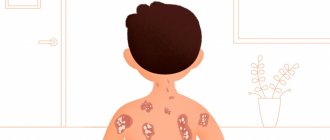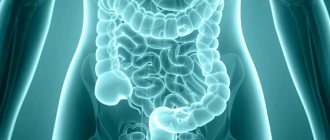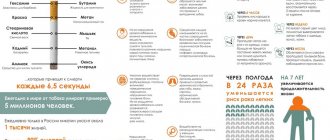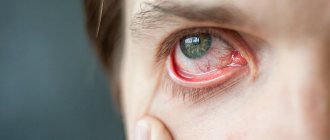Why is it so difficult for many people to quit smoking? The fact is that the addiction caused by smoking cigarettes is akin to a drug addiction, since addiction occurs at the physical level. Nicotine, which is part of tobacco, is included in the metabolism of a smoker. This is why it is so difficult to quit smoking without the help of specialists - for some time after getting rid of a bad habit, the body is rebuilt. And this manifests itself not only in positive, but also in negative aspects.
It is best to know in advance what happens to the body after quitting smoking in order to be prepared for these manifestations. Remember: your decision to quit smoking will help improve your health and improve your overall quality of life.
Negative aspects of quitting smoking
As we have already said, after quitting smoking, the body begins to rebuild its metabolism. As a result, the former smoker begins to experience a number of unpleasant symptoms. Fortunately, this only lasts for the first months, and after the metabolism normalizes, everything returns to normal.
Among the negative manifestations:
- emotional imbalance: tearfulness, irritability, aggressiveness, depressed mood;
- sleep disorders: insomnia, restless sleep, nightmares;
- susceptibility to colds due to a temporary decrease in immunity;
- unpleasant taste in the mouth after quitting smoking, associated with liver recovery;
- headaches, dizziness;
- weight gain, because against the background of emotional discord and the need to do something to drown out the craving for cigarettes, the former smoker begins to eat more.
Strengthening good habits
It is advisable to consult a psychotherapist to consolidate good habits. If you are depressed and anxious, your doctor will select the necessary mild antidepressants, which will help you work actively and communicate freely with people. Experts, as a rule, suggest how to relieve muscle tension in a particular case, and recommend special breathing exercises and auto-training.
The first 14 days without cigarettes
The body's response to quitting smoking is most intense in the first two weeks after quitting tobacco. All symptoms that appear at this time are a consequence of the so-called nicotine fasting: the body is cleansed of nicotine, but the processes in which nicotine participated have not yet been rebuilt.
We will describe in detail, day by day, below the emotional and physical manifestations that will accompany quitting smoking, and the changes in the body at this time.
Then the symptoms will no longer change daily. A former smoker gets used to the normal state, and the changes will not be as bright and noticeable as in the first days. Therefore, further we will describe the consequences of quitting nicotine on a monthly basis.
First day
At the beginning of the journey, a person who is trying to quit a bad habit feels an emotional uplift, is determined to get rid of the addiction and is confident in future success. Against this background, the craving for nicotine is absent or easily blocked by willpower and distraction by other things.
The carbon monoxide content in the blood gradually decreases and, on the contrary, the oxygen content increases. A person feels that it has become easier to breathe; an excess of oxygen can even cause slight dizziness. For many experienced smokers, this ease of breathing becomes a revelation.
Some experience a decrease in appetite, weakness, and slight anxiety. You may have difficulty falling asleep or have trouble staying asleep.
Quite often it is recommended to keep a diary to record all stages of the addiction recovery process.
Second day
Symptoms of nicotine starvation begin. A severe cough and shortness of breath appear.
The ciliated epithelium of the lungs begins to restore its functions. Sputum production is reduced. The inflamed intestinal mucosa begins to regenerate. Appetite decreases, and mild abdominal pain may occur. There may be an increased urge to urinate.
There is almost no change in the psychological state. The person is still on the rise, but slight irritability appears, which is quite easy to suppress with an effort of will. Self-hypnosis techniques help, constant reminders to yourself why the decision was made to quit (recovery).
Sleep is often restless; nervousness and obsessive thoughts can cause problems falling asleep. You may feel drowsy during the day.
The third day
The tone of blood vessels increases, blood supply to the heart and brain improves. Regeneration of the bronchial mucosa begins, normalization of the pancreas.
The physical craving for cigarettes decreases slightly. While these changes are invisible, they occur at the cellular level.
The skin becomes dry, begins to peel, and small pimples (dry) may form.
Appetite increases, cravings for sweets appear (or intensify). Heartburn may bother you.
Some people experience tinnitus, dizziness, and a feeling that their heart is “squeezing.” Symptoms of psychological dependence intensify. A former smoker becomes more and more nervous, it is difficult for him to concentrate on anything, his thoughts always return to the cigarette.
Fourth
By this time, dizziness usually goes away, and the blood supply to the brain normalizes. But I still have concerns about tinnitus and surges in blood pressure. The face and fingers may swell.
Cough continues; Often a person has the feeling that there is a viscous mucous lump in the throat - the latter means that a restructuring of the system for producing bronchial secretions is taking place in the bronchi.
Emotionally, aggressiveness decreases and depression goes away. Many patients at this stage say that they expected more serious manifestations of nicotine withdrawal.
The sleep is still disturbing and superficial. Increased appetite and cravings for certain foods persist.
Fifth
Regeneration of the respiratory system continues, normalization of the functionality of the bronchi and lungs. But you still feel a lump in your throat, and dark mucus may come out when you cough
By this time, little remains of the emotional high of the first day. There is a risk of breakdown, which is further facilitated by deteriorating health. It is important to remember that all quitters experience this, and many quite successfully.
Small microcracks begin to disappear from the surface of the tongue. The perception of taste is restored.
Sixth
The functioning of the stomach and pancreas continues to normalize. Increased thirst often appears, and with it frequent urination. Some people experience bitterness in the mouth and painful sensations in the liver area. Appetite is reduced.
Many people note sweating, dry mouth, trembling hands, and nausea during this period.
Those who quit smoking become nervous, aggressive, and sometimes whiny. Every little thing causes an emotional reaction, and self-control decreases. You can consult your doctor and start taking anti-anxiety medications.
Seventh
The body is rebuilding to work without nicotine, although mucus continues to be released when coughing, and the feeling of a lump in the throat has not yet gone away. There may be occasional bowel movements. Fatty foods are poorly accepted (heartburn may occur), but overall appetite increases. The skin remains dry and flaky.
“Cigarette syndrome” and other provoking situations.
Tenth
Internal motivation is falling, so now those who quit smoking really need the support and encouragement of loved ones and those around them. A person can hardly tolerate people smoking nearby.
The restoration of the immune system begins. The cough continues. If light yellow or gray clots come out during a cough, you should definitely contact an otolaryngologist. A cough can be softened with a warm drink.
Eleventh
More oxygen enters the body, which can cause dizziness, trembling of fingers, and headaches.
Emotional sensitivity, temper, or vulnerability for any reason persists.
There is a desire to test yourself by smoking “just one cigarette” and remember its taste. At the same time, the smell of tobacco smoke is disgusting.
Appetite is still increased.
Twelfth
The condition of the skin improves, largely due to the normalization of blood circulation. A healthy complexion returns.
The cough softens, and chronic inflammation in the lungs gradually disappears. Intestinal functions are restored.
The neuropsychic state has not yet improved, which means that the person still greatly needs the support of loved ones.
Thirteenth
Malaise of uncertain localization may occur, a feeling of heaviness in the back of the head, and weakness may appear. There are surges in blood pressure.
Usually during this period a person strives to reach the two-week mark, so the risk of relapse is not very high - the desire to take a cigarette is suppressed by this desire.
Fourteenth
The cough begins to subside, the complexion continues to improve, and the yellow coloring of the fingers goes away. Vegetative-vascular disorders may still be present - lethargy, drowsiness, weakness.
Two weeks is the first serious milestone, and it is psychologically important not to break down on this day. A common mistake is to assume that one cigarette after 14 days of abstinence will not harm. In fact, it can derail the entire smoking cessation process.
Quit smoking. Consequences by month
I have not smoked for 2 months or 90 days!
Well, everything is much easier:
- Almost no irritability
- The feeling of “vacuum” in the body disappears
- We have already learned a little to control our appetite.
There is almost no “reflex” to light a cigarette for any reason; we can now freely stand among people who smoke. But a treacherous thought sometimes creeps in - “Why don’t I smoke? I wish I could smoke!”
Everyone asks and is surprised: “How did you quit?” But you don’t know what to say, it seems like you didn’t do anything difficult, but now it’s clear - quitting smoking is not difficult!
's actually EASY TO QUIT SMOKING! If you prepare thoroughly and get enough information, then everything will go easily.
You need to learn, understand, believe that smoking is harmful and unnecessary!
After all, after this:
- You won't become a slave to habit!
- You won’t be a dupe who was “sold” for his own money—a ruiner of health!
- You can’t wish an early death on your children , and that’s exactly what smokers do!
- You won’t want to leave your warm apartment for a smoke break!
- It will be stupid for you to spend money on THIS !
Six months is the one hundred and eightieth mark on the calendar!
Congratulations! You have been a non-smoker for six months now!
I won’t give any special recommendations, I’ll just remind you: “Don’t play: will I smoke or not?” You will definitely lose! You shouldn’t even try, do even one “traction”, it won’t help you.
No matter how funny it is, the desire is still there. Yes, it is minimal, but still. This really surprised me!
12 months! So much?
A year has passed.
Sometimes, in especially difficult moments, it seems that a cigarette will help solve the problem... Here! How strong is the psychological subtext in this (smoking ritual) process!
Dreams confirm this. While “digging” into this problem, I learned that almost every smoker who quit smoking has dreams like this: Some kind of problem, I calmly light a cigarette, everything is as always... but... here... here... Some unpleasant feeling from within, something... that’s not true... And horror... I haven’t SMOKED for a year!!! Everything is gone, all my torment is in vain... how pitiful and bitter...
And then I wake up, covered in sweat, a minute later it dawns on me - it’s just a dream! Huh...
Do you have such dreams?
What happens to your body when you quit smoking for a year?
Doctors say that we have already reduced the following risks:
- Lip cancer – 99%
- Liver and lung cancer – 85%
- Esophagus and stomach – 65%
- Heart attack – 49%
- Stroke – 31%
Changes in the first month after quitting smoking
Let's see how the body recovers after quitting smoking in the second half of the first month.
Feel. Those who quit smoking are still bothered by dizziness, headaches, and blood pressure surges - the brain now receives more oxygen and has not yet adapted to this. The cough with sputum production becomes weaker towards the end of the month. The perception of smells and tastes of food is normalized - for someone quitting smoking, this is felt as a sharpening of the senses of smell and taste, since they were previously dulled. Weight gain is possible due to improved appetite. Since the regeneration of the gastrointestinal mucosa is still ongoing, abdominal pain, constipation, and diarrhea may still bother you.
Changes in the body. The body is restored at the cellular level, harmful substances, for example, products of the processing of nicotine tar, are intensively removed. Feeling better. Regeneration of the bronchial mucosa occurs.
Blood cells are renewed: leukocytes - faster, red blood cells - slower. Vascular tone increases. This improves immunity and tissue nutrition. The yellowness from the fingers continues to disappear, and the complexion improves.
Psycho-emotional state. Aggression and irritability are less than in the first days. Psychological dependence on smoking still persists, and symptoms of “breathing deep” syndrome are present. Normal functioning of the stomach and intestines was restored. Liver regeneration begins (from 5 months).
Psycho-emotional sphere. The mood is cheerful and stable. Sleep is normalized. The craving for cigarettes is easily suppressed, because at this point it represents only a slight desire to return to a familiar ritual. A person develops other habits with which he replaces the ritual of smoking. But breakdowns are still possible under provoking circumstances.
Why do you need a smoker's calendar?
Smoking is a pathological addiction, which is based on a tendency to quickly form bad habits. The psychological aspect also determines the methods of treatment - it is impossible to create an effective therapeutic regimen without a clear plan. The non-smoking calendar helps you achieve your goals every day, motivating a person to empirically verify the information presented. Forming firmness of intentions, new, healthy habits, satisfying banal curiosity, ultimately leads to a positive result.
The Quit Smoking Calendar will be useful at all stages of quitting nicotine, from the desire to quit to maintaining a stable remission.
Second six months
In the seventh and eighth months after quitting smoking:
- the restoration of olfactory receptors continues, so the former smoker discovers more and more new shades of smells and tastes;
- cough becomes rare, as the regeneration of cells of the respiratory system is in full swing. Lung capacity increases even more. The hoarseness of the voice goes away as the vocal cords are restored;
- the yellow plaque of a smoker gradually disappears from the teeth;
- liver cell restoration continues;
- the psycho-emotional state is still stable and cheerful.
Ninth month
This is a month of crisis, in which you need to be especially careful not to break down. On the one hand, the habit of smoking has not yet been completely destroyed, on the other hand, the person has already forgotten all the negative aspects of smoking, has become accustomed to feeling good, and he has the illusion that nothing bad happened.
Tenth month
During this period, patients often have realistic dreams that they are smoking again, and this leaves a painful feeling upon awakening.
Eleventh month
Thoughts about smoking come very rarely and are easily dismissed by the mind as something unnecessary. Psychological dependence has almost completely disappeared.
One year after quitting smoking
A year without cigarettes is a serious achievement. During this period, the body usually recovers so much that the risk of stroke (by 30%), heart attack (by 50%) and the likelihood of lung and liver cancer (by 80-90%) is reduced. Women who have become pregnant by this point do not have to worry about the risk of miscarriage - its probability is almost the same as for non-smokers.
The risk of relapse is minimal, but it is worth remembering what you went through to get to this point. It is not worth risking such an achievement for the sake of one cigarette.
Cleansing blood vessels
You can help your blood vessels function normally in the following ways:
- abandon not too physiological poses . It is important to avoid crossing your legs, sitting with your feet underneath you, or leaning on one hand. For people with sedentary work, it is important to properly organize their space. You can purchase an anatomical chair, ensure the correct position of the body at the desk;
- monitor your body position while sleeping . Do not use high pillows or too soft mattresses. This is useful not only for blood vessels, but also for the entire musculoskeletal system;
- drink enough liquid . The recommended daily dose of water is 30 ml per kilogram of weight. The main volume of fluid should occur during the active part of the day, five hours before going to bed.
It is important to warm up regularly and prevent blood stagnation. For this purpose, hourly breaks are provided during the working day.
How to help your body when quitting smoking
Three things will help reduce the intensity of unpleasant symptoms when quitting smoking and recover faster. This:
- Fresh air. Walk in parks and forests more often, ventilate the room more often. Play sports outdoors. This helps clear the lungs faster and restore normal functioning of the respiratory system.
- Special food. Include in your diet foods rich in vitamins C, A, E, and rutin - with their help, nicotine will be removed from the body faster. To normalize the functioning and cleanse the gastrointestinal tract, potato decoction, mucous decoctions of flaxseed, rice or oatmeal are useful.
- Sport. Not immediately (in about six months), but you need to include physical exercise in your schedule. This will strengthen the heart, speed up metabolism, and increase lung capacity. In addition, they have a positive effect on overall well-being due to the release of endorphins.
Ways to cleanse the respiratory system
The following will help speed up the natural process of clearing your lungs after smoking:
- regular walks in the fresh air;
- ventilation of the room with a through air flow - at least four times a day;
- using a humidifier, especially in winter;
- daily wet cleaning.
Fitness classes, yoga, swimming, jogging are welcome. It is best to engage in physical activity under the guidance of a trainer. It is important not to forget about daily morning exercises.
Do you need psychotherapeutic help when quitting smoking?
Of course, willpower, determination and a willingness to overcome difficulties can greatly help a person cope with addiction and restore the body after quitting smoking. However, cravings for cigarettes associated with psychological dependence may still persist.
Some smokers find themselves having to try again to quit the bad habit. This happens when a person returns to it a few weeks or months after quitting smoking. Only a small percentage of people can truly quit smoking permanently without help. Therefore, it is extremely important to seek help from a psychotherapist in a timely manner.
During the consultation, the specialist will explain the consequences of consuming tobacco smoke tar and nicotine and will help to form a strong motivation to quit smoking. With the support of a doctor, it will be easier for a smoker to overcome psychological dependence; he will learn to get out of stressful situations without the help of cigarettes. During sessions, the specialist uses techniques that promote relaxation, overcome psychological discomfort and change well-being, making the process of quitting smoking as painless as possible.
As a result, with the patient’s desire, the support of loved ones and the help of a qualified doctor, the person’s desire to smoke is suppressed, and the effect persists even several years after the end of psychotherapy.
How does everything happen for men?
Sleep becomes full and refreshing. If a person abruptly quits smoking, then after the intake of toxic substances stops, the brain begins to rest better and work more productively. The consequences of such a step for the body are, without a doubt, positive. The mood of someone who quits a bad habit improves. Smokers usually don't get enough sleep. What mood will they be in? The answer is obvious.
It doesn’t matter whether a young woman has given up a bad habit or an elderly man has freed himself from nicotine - this makes the life of any person more harmonious. What problems are leaving him? Chronic lack of sleep, constant fatigue, lack of energy are just a small part of them. Now all this is in the past.









